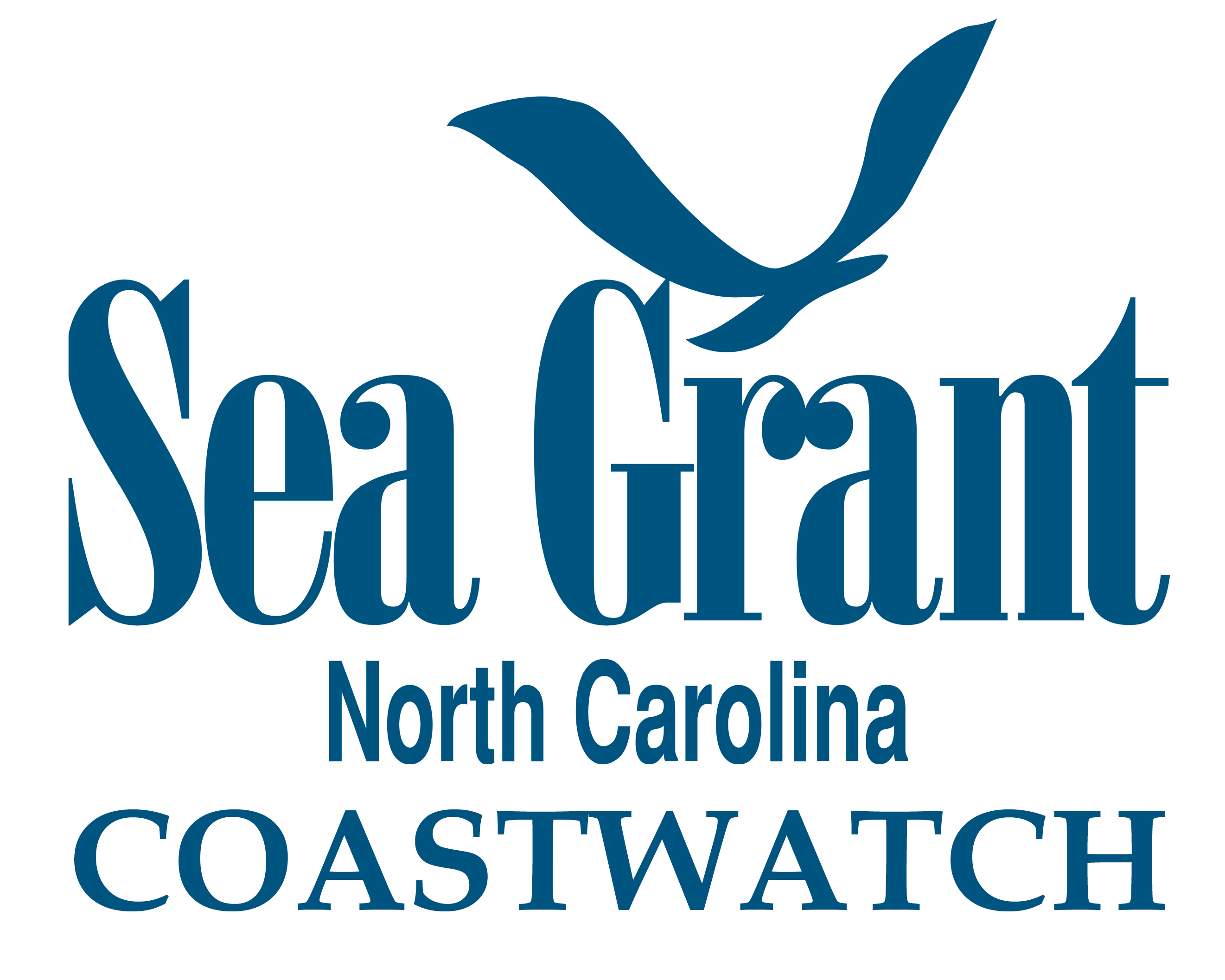By KATIE MOSHER
Michael Voiland’s selection of fedora hats suits the season, the style and often the music.
He also has donned multiple professional hats in the past six-and-a-half years. “This experience has been fun, rewarding and gratifying,” Voiland says of his tenure as executive director of North Carolina Sea Grant and, since 2009, as leader of Water Resources Research Institute of the University of North Carolina, known as WRRI.
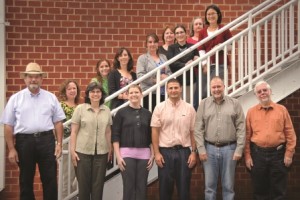
Many Sea Grant and WRRI staff were on hand for an official photo for the NC State University Awards for Excellence program. Photo by Roger Winstead/NC State University.
“Mike has added new duties; responded to budget adjustments; offered state, regional and national leadership; and identified emerging issues,” says Terri Lomax, vice chancellor of North Carolina State University and Voiland’s direct supervisor. “He does it all without missing a beat.”
That’s not surprising for Voiland, who plays two keyboards simultaneously in his band, offering the baseline along with rhythm and melodies. “Similarly, he has led Sea Grant and WRRI with multitasking expertise,” adds Jack Thigpen, Sea Grant extension director.
The multitasking began in 2006, a year of change for Voiland as he retired from Cornell University, married Nancy Fey, and together they moved to North Carolina.
He arrived with a sense of confidence. His career included years as extension program leader for the New York Sea Grant Institute, and stints as institute interim director. He had collaborated with other programs from across the national network. He innately understood the federal/state program concept. He even had identified “certain expectations” of being a director.
Voiland soon realized that things were going to be different in North Carolina. Within two short months, the N.C. General Assembly handed him another hat. Legislators established the Waterfront Access Study Committee, known as WASC, with Voiland as its chair and Sea Grant staff handling committee administration.
“Nothing in my past experience with Sea Grant reflected the great confidence in and support for Sea Grant shown in North Carolina by stakeholders, the legislature and agencies,” he recalls. “That was great testimony to veteran staff and the past leadership of directors B.J. Copeland and Ron Hodson.”
Voiland jumped into learning the complexity and intensity of problems enumerated not only in the WASC legislation, but also in a Sea Grant conference held just before his arrival.
“It was trial by fire in that it ramped up the speed by which I would learn so much about the coast, in terms of cultural, historical and biological factors, as well as its existing infrastructure,” he recalls.
“Ultimately, it was a welcoming gift. It was truly a good thing in terms of my education about North Carolina,” he adds. “And Sea Grant was able to help the state move forward in addressing critical issues.”
ACCESS SUCCESS
The value of his leadership was cited by the panel at the time, and continues to this day.
In 2007, legislators allocated $20 million to a new Waterfront Access and Marine Industries Fund, or WAMI, that in turn leveraged matching support. Ultimately, about a dozen projects moved forward with a total investment value of more than $50 million. Voiland also served on the WAMI review panel.
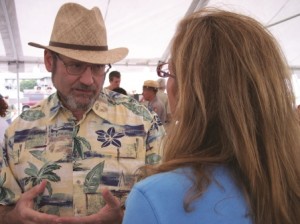
Mike Voiland chats with Robin Mann, a member of the Waterfront Access Steering Committee, during a past Day at the Docks event.
“Mike’s counsel and participation in the implementation of the WAMI Fund was invaluable,” explains Louis Daniel, director of the N.C. Division of Marine Fisheries.
WAMI accomplishments include completion of Jennette’s Pier in Nags Head, part of the N.C. Aquariums. The facility provides daily fishing for residents and visitors, along with educational programming and meeting space. Two other piers, one in the central coast and one in the southern coastal region, were recommended by WASC. They have been planned locally, but have not been built.
Voiland cites other WASC recommendations that came to pass. Counties now can set property taxes based on the present use value of a waterfront-based business, rather than on the land’s potential for other new development.
Increases in boating registration fees fueled another fund. State agencies began working more closely to provide access at bridges and rights of way. These recommendations and more came through the large panel that included representatives of groups that traditionally had been at odds. Yet, all the members arrived with an intention to listen and work together, Voiland explains.
“The dynamic was quite positive, but strong opinions were expressed,” he recalls with a smile.
The breadth of the panel and its detailed report drew national attention. Voiland was invited to present the North Carolina experience at meetings in several states.
He told of public comments where stories flowed of fish houses, public fishing piers and other traditional businesses that had closed. He also noted how Sea Grant funded a study to identify and inventory fish houses along the state, in order to quantify the community changes.
Since the initial inventory results were announced in 2007, the economy has stalled. So Voiland approved another small study to update the tally. While the rate of closures has slowed, the 2012 report shows that the total number of fish houses continues to drop.
At the same time, some owners cite increased interest in “local catch” species for wholesale and retail sales — recognizing marketing efforts that Sea Grant has supported along the coast.
SMALL STEPS
Each fish house study was funded through Sea Grant’s program development opportunities or minigrants. Such projects typically run less than $5,000 and are available throughout the year.
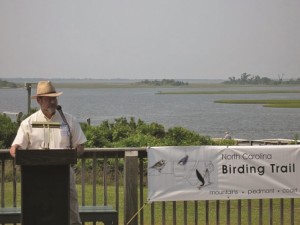
The N.C. Birding Trail is one of the many programs in which Sea Grant is a strong partner. NCSG file photo.
Voiland values flexibility to respond to immediate needs. Minigrant proposals go through topical and technical reviews to ensure they meet Sea Grant standards and strategic plan, yet the turnaround is quick, allowing rapid response to new topics, and the ability to get baseline and updated data sets needed for larger proposals to other agencies.
“I am proud that our minigrants have made significant impacts, and that a National Sea Grant site review panel identified our process as a best management practice for the entire network,” he notes.
Projects include an annual graduate fellowship in maritime heritage that is a partnership with a unique program at East Carolina University. Other fellowships have been funded in partnerships with the N.C. National Estuarine Research Reserve/N.C. Coastal Reserve, another program that receives federal funding from the National Oceanic and Atmospheric Administration, as Sea Grant does. This fall, Sea Grant initiated a graduate fellowship with the N.C. Coastal Resources Law, Planning and Policy Center and the University of North Carolina School of Law.
Voiland takes particular note of the RecText project that provided a proof of concept for anglers to officially report catches via simple cell-phone texting. After an original minigrant of less than $2,000, Scott Baker, a Sea Grant fisheries specialist, expanded the demonstration with state funding to test the concept at tournaments. The results have drawn national attention, with variations being tested in several states and considered for broader use by NOAA.
In addition to leading North Carolina Sea Grant’s focus on research, outreach and education, Voiland has worn several more hats, such as serving on the steering and executive committees for NOAA in the Carolinas, an informal group that Sea Grant helped launch a decade ago.
He also cultivated strong collaborations among South Atlantic Region Sea Grant directors. “He is a trusted colleague and a true friend,” says Rick DeVoe, South Carolina Sea Grant Consortium director. “Mike was very careful to assess an opportunity that was put before him, but once he saw the values for the partnership and the intended constituencies, he was fully committed to seeing the effort get off the ground and succeed.”
DeVoe also cites Voiland’s work with the Sea Grant Association, including defining a reputation and value for the network of state-based programs. “Mike has made significant contributions to the national Sea Grant program through his knowledge of and insight regarding the federal legislative process and his experience with government affairs,” DeVoe says.
Voiland also has earned praise from Sea Grant partners in North Carolina. Liz Baird, education director for the N.C. Museum of Natural Sciences and current chair of the North Carolina Sea Grant Advisory Board, points to his management style and interactions with the board.
“He showcases the diverse array of Sea Grant projects by handing the reins over to the staff who actually have the ‘feet on ground’ experience with the activities. He builds in opportunities for conversations and collaborations, as well as structured feedback,” she says. “His easy laugh, passion for music, and long-standing commitment to protecting, researching and showcasing our natural resources made him an ideal leader.”
Daniel also cites Voiland’s ongoing commitment to a Sea Grant/DMF fellowship that provides timely data used in various fishery management plans and the N.C. Coastal Habitat Protection Plan. Fellows emerge with an understanding of management protocols and peer-reviewed journal publications. “This has been an awesome collaboration,” Daniel says.
TIMES A-CHANGIN’
By 2008, Sea Grant’s organizational placement and Voiland’s reporting lines had moved from the University of North Carolina System to NC State, which had been the program’s physical and administrative headquarters for decades.
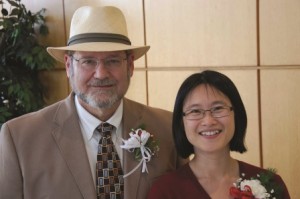
Voiland and E-Ching Lee earned honors from NC State earlier this year. Photo by Gene Pinder/ NC State University.
The role of Sea Grant did not suffer in the change. “In fact, it has thrived,” he explains, citing Sea Grant’s selection as one of only a handful of statewide centers and institutes to continue to be recognized by the UNC system. “We were able to demonstrate that Sea Grant is truly an interinstitutional program, with a multicampus presence and a broad level of support.”
That short list also includes WRRI. Over the years, Voiland had known of WRRI — another federal/state partnership, this time with the U.S. Geological Survey — through its water quality and quantity work at Cornell in New York, nationally, and in North Carolina.
When WRRI was in need of a director, Voiland pondered an opportunity. “It was a time of budget stress for all state government entities, especially in terms of university centers and institutes,” he says.
He recalls a meeting with Lomax where he offered to add WRRI duties, a move that would be a cost savings for the university overall and the two aquatic programs in particular. “It was very clear to me that there were great similarities in the Sea Grant and WRRI missions and approaches,” he says.
“The decision to allow me to become WRRI director ultimately also allowed us to develop better management strategies for these aquatic research and outreach programs, to identify potential for other shared positions, and to develop new joint research projects,” he adds.
For Lomax, the opportunity to have one director for both programs made sense. She tested it out as an interim appointment for several months before making the additional assignment permanent.
When Voiland announced his retirement, the opening was advertised as one position covering both programs. That, he says, was gratifying.
For WRRI, Voiland serves on panels looking at statewide water quantity issues, as well as efforts to improve drinking water quality by reducing sediment runoff into streams. “Mike also actively participated in the work of the State Water Infrastructure Commission. He provided critical resources from WRRI to help promote water audits and other water industry best practices,” notes Bill Holman, chair of the commission.
“Mike has made many, many contributions to North Carolina, Sea Grant and WRRI,” adds Holman, also director of state policy at Duke University’s Nicholas Institute for Environmental Policy Solutions.
Dianne Reid of the N.C. Division of Water Quality and a WRRI advisor agrees. She describes him as a calming force in discussions that can become intense. “He will ask really good questions,” she says. “He has a way of looking at the bigger picture.”
He is professional, yet personable, she adds. “And his music adds a broader dimension.”
SETTING THE BEAT
In his New York career, Voiland’s hats had ranged from Great Lakes Sea Grant specialist to extension program leader, interim Sea Grant director, and assistant director of government affairs with Cornell and assistant director of its Agricultural Experiment Station and Cooperative Extension Program.
That variety of topics and management duties has proven to be great fodder and training for his North Carolina duties.
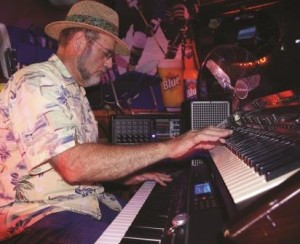
Never missing a beat, Voiland plays two keyboards at the same time. Photo courtesy MikeMickXer.
He had grown up on Long Island before heading to college and graduate school inland. Voiland’s parents retired to Florida decades ago. He still visits his mom, but he has no intentions of moving farther south.
In fact, his second retirement is providing yet an expansion of his music career with MikeMickXer, the band in which he is known as Mick. That name harkens to his youth with a father also named Mike. He is joined on stage by guitarist and lead vocalist Mike Davis, and drummer Gary Grier.
The three met in Zydecopious, a larger band that Voiland had pulled together not long after he arrived in North Carolina. A few zydeco tunes are still in their repertoire, but now their genres are mainly reggae, rockabilly, and rhythm and blues. The trio is booked most weekends in the Triangle, with gigs sometimes in the mountains or at the coast.
“Little did I realize how well the trio would catch on,” Voiland notes. In fact, it has cut into his car hobby. In the past, he would participate — and take honors often — in about a dozen car shows a year with his rare Pontiacs. He has only shown a car in one show in the past year.
Blame the band’s chemistry, Nancy Voiland says. “When the three of them come together, something magical happens. It’s all about getting people on the dance floor and having a great time. They all feed off of the audience reaction.”
She notes that he grew up playing organ, piano and guitar, and had a band in high school. “Two years in a row his band came in second in a local high-school band audition. The band that came in first both years had a lead singer named Billy, who was from Hicksville, N.Y. Yes, that would be Billy Joel.”
MOVING ON
Mike Voiland will have a few weeks in December working at NC State alongside Susan White as she takes the helm of Sea Grant and WRRI.
He is pleased to be turning over both programs on solid ground in terms of budget savings, plans that meet each program’s defined mission, and results receiving respect at local, state, regional and national levels.
NC State’s Office of Research, Innovation and Economic Development cited a similar list of accomplishments when colleagues selected Voiland for an Award for Excellence earlier this year.
If he has any regrets, it will be that the additional administrative responsibilities since 2009 limited his ability to spend much time in the field to meet with extension specialists and stakeholders.
Yet, Voiland notes there has been a consistency throughout his tenure at Sea Grant and WRRI. “I am thankful for a tremendous amount of support, discretion and flexibility that was granted by NC State, the university system and veteran staff.”
His work, and his hats, won’t soon be forgotten.
“He’s been a great colleague,” Holman says. “He’s inspired me to invest in some straw hats — for ear protection, you know.”
This article was published in the Holiday 2012 issue of Coastwatch.
For contact information and reprint requests, visit ncseagrant.ncsu.edu/coastwatch/contact/.
